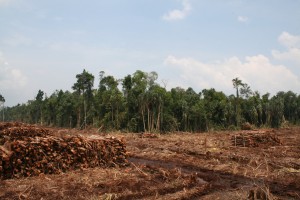 On May 15th, Asia Pulp and Paper (APP) announced several “new” commitments that appear to have the potential, if implemented, to address some of the numerous controversies surrounding the company’s notoriously destructive operations. It is encouraging to see APP acknowledging many of the negative impacts associated with its business model that the company has, at different times, denied. Unfortunately, many of these “new” commitments are weaker variations of promises APP has already repeatedly made — and consistently broken — since the 1990’s.
On May 15th, Asia Pulp and Paper (APP) announced several “new” commitments that appear to have the potential, if implemented, to address some of the numerous controversies surrounding the company’s notoriously destructive operations. It is encouraging to see APP acknowledging many of the negative impacts associated with its business model that the company has, at different times, denied. Unfortunately, many of these “new” commitments are weaker variations of promises APP has already repeatedly made — and consistently broken — since the 1990’s.
The bottom line is that APP’s current business practices are inextricably linked to rainforest destruction and chronic conflicts with communities whose lands are being logged and converted to industrial pulp plantations in order to feed APP mills. This new statement should be viewed as another attempt to mollify valid concerns with unproven rhetoric from an untrustworthy company. Rainforest Action Network is advising current and potential customers, supply chain partners, and investors not to do business with or entrust their brand or values to APP until the company and its affiliates demonstrate meaningful engagement and adopt proven, comprehensive reforms.
Rainforest Destruction: In its statement, APP makes a temporary commitment to suspend natural forest clearance in its “owned concessions,” which reportedly include over one million hectares of forest. The reality is, APP will continue to feed rainforest trees to its pulp mills into the foreseeable future. The company has consistently failed to make maps and wood supply data available for the forests it controls or that are controlled by its suppliers. This means that commitments relating to changing practices in specific areas and to monitoring its wood supply are opaque and empty.
Social Conflict: There are numerous cases of active social conflict in APP’s concessions. APP’s newest commitment does not address how existing social conflicts will be resolved, nor does it address how rights of communities will be upheld throughout APP and its suppliers’ current and future operations.
Greenhouse Gas Pollution: Much of APP’s pulpwood operations are located in highly emissive deep peat landscapes, making APP paper one of the most greenhouse gas intensive companies in the world. In its policy, APP states it “will lead an independent research initiative and multi-stakeholder engagement on High Carbon Stock (HCS),” but makes no commitments to outcomes or actions that will lead to a reduction in its greenhouse gas emissions.
Broken promises: Asia Pulp and Paper has a long history of making and breaking financial, environmental and social commitments. Since the 1990’s, APP has been promising its financiers that it will end the conversion of rainforests for its pulp and paper mills. However, having failed to do so by 2007, APP then promised to end its reliance on rainforest conversion by 2009. In 2009, having again failed to do so, APP revised its commitment to be rainforest-free by 2015. In its May 2012 commitment, APP now only aims to stop conversion of High Conservation Value Areas by 2015, which, according to the World Wildlife Fund would, if implemented, only set aside small areas and leave the door open for continued rainforest conversion outside of such designated areas.
Don’t be fooled, APP’s Real Commitments are Moving Even Farther in the Wrong Direction: Despite APP’s continued inability to move to rainforest- and conflict-free fiber sources for its existing Sumatra mega mills, in February 2012 Pulp and Paper International magazine reported that APP is actively developing plans to expand its capacity by building yet another new mill in Sumatra, which APP intends to be the biggest pulp mill in the world. This is exactly the opposite direction from a company truly committed to ending rainforest destruction.